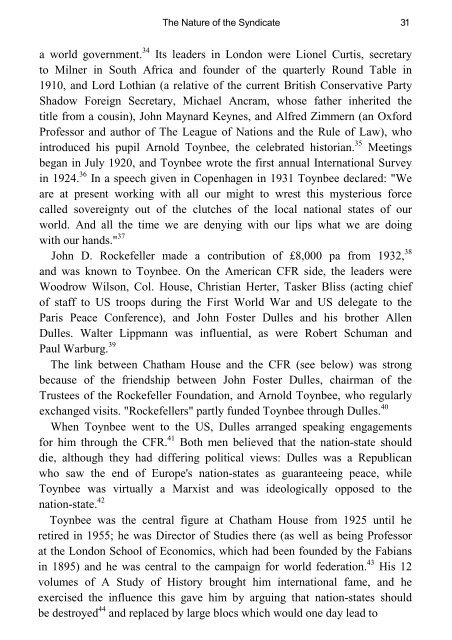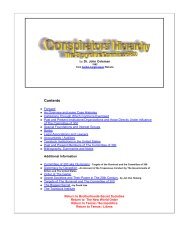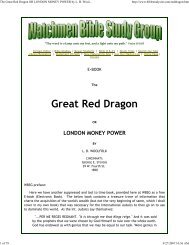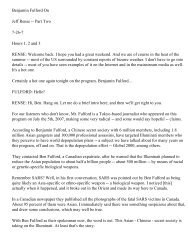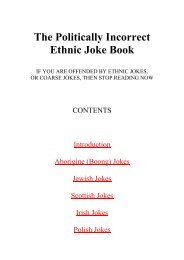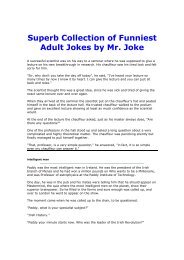- Page 1 and 2: NOTE TO THE READER This book is an
- Page 3 and 4: CONTENTS Note to the Reader .......
- Page 5 and 6: X The Syndicate by a war against te
- Page 7 and 8: 2 The Syndicate The events of the l
- Page 9 and 10: 4 The Syndicate of State, had a law
- Page 11 and 12: 6 The Syndicate democracy. Of cours
- Page 13 and 14: 8 The Syndicate lived, 4 with a for
- Page 15 and 16: 10 The Syndicate a little over $300
- Page 17 and 18: 12 The Syndicate Jr. to beat Gore,
- Page 19 and 20: 14 The Syndicate The Rockefellers T
- Page 21 and 22: 16 The Syndicate New York City, and
- Page 23 and 24: 18 The Syndicate "Rockefellers" Wre
- Page 25 and 26: 20 The Syndicate campaign against G
- Page 27 and 28: 22 The Syndicate Vanderlip and the
- Page 29 and 30: 24 The Syndicate the common interes
- Page 31 and 32: 26 The Syndicate journal brought ou
- Page 33 and 34: 28 The Syndicate these movements. F
- Page 35: 30 The Syndicate The Royal Institut
- Page 39 and 40: 34 The Syndicate group's Constituti
- Page 41 and 42: 36 The Syndicate attend the meeting
- Page 43 and 44: 38 The Syndicate descended from the
- Page 45 and 46: 40 The Syndicate With George Washin
- Page 47 and 48: 42 The Syndicate inscription "E Plu
- Page 49 and 50: 44 The Syndicate An effort is being
- Page 51 and 52: 46 The Syndicate States of Africa.
- Page 53 and 54: 48 The Syndicate I have considered
- Page 55 and 56: 50 The Syndicate These dark visions
- Page 57 and 58: 52 The Syndicate there is a strong
- Page 59 and 60: 54 The Syndicate advisors Lionel Cu
- Page 61 and 62: 56 The Syndicate obtained a 60-year
- Page 63 and 64: 58 The Syndicate when production wa
- Page 65 and 66: 60 The Syndicate of mankind; the St
- Page 67 and 68: 62 The Syndicate The Syndicate Now
- Page 69 and 70: 64 The Syndicate the Rothschilds an
- Page 71 and 72: 66 The Syndicate In this chapter we
- Page 73 and 74: 68 The Syndicate December 1946 the
- Page 75 and 76: 70 The Syndicate written by Joseph
- Page 77 and 78: 72 The Syndicate with the principle
- Page 79 and 80: 74 The Syndicate medium-range balli
- Page 81 and 82: 76 The Syndicate owned bank - he ha
- Page 83 and 84: 78 The Syndicate divided by the 17t
- Page 85 and 86: 80 The Syndicate that would not int
- Page 87 and 88:
82 The Syndicate Detente When Richa
- Page 89 and 90:
7 THE UNITED STATES OF EUROPE AND R
- Page 91 and 92:
The United States of Europe and Rus
- Page 93 and 94:
Currency The United States of Europ
- Page 95 and 96:
Policing The United States of Europ
- Page 97 and 98:
The United States of Europe and Rus
- Page 99 and 100:
The United States of Europe and Rus
- Page 101 and 102:
The United States of Europe and Rus
- Page 103 and 104:
The United States of Europe and Rus
- Page 105 and 106:
Monarchy The United States of Europ
- Page 107 and 108:
The United States of Europe and Rus
- Page 109 and 110:
The Cost of British EU Membership T
- Page 111 and 112:
The United States of Europe and Rus
- Page 113 and 114:
The United States of Europe and Rus
- Page 115 and 116:
The United States of Europe and Rus
- Page 117 and 118:
The United States of Europe and Rus
- Page 119 and 120:
The United States of Europe and Rus
- Page 121 and 122:
The United States of Europe and Rus
- Page 123 and 124:
120 The Syndicate and guarantee Wes
- Page 125 and 126:
122 The Syndicate a United Nations
- Page 127 and 128:
124 The Syndicate for nearly 50 yea
- Page 129 and 130:
126 The Syndicate dangerous spot in
- Page 131 and 132:
128 The Syndicate Committee of the
- Page 133 and 134:
130 The Syndicate But on the same d
- Page 135 and 136:
132 The Syndicate Later Development
- Page 137 and 138:
9 THE MIDDLE EAST REBELLION Let him
- Page 139 and 140:
The Middle East Rebellion 137 feder
- Page 141 and 142:
The Middle East Rebellion 139 $50m
- Page 143 and 144:
The Middle East Rebellion 141 out o
- Page 145 and 146:
The Middle East Rebellion 143 refug
- Page 147 and 148:
The Middle East Rebellion 145 raid
- Page 149 and 150:
The Middle East Rebellion 147 sold
- Page 151 and 152:
The Middle East Rebellion 149 four
- Page 153 and 154:
The Middle East Rebellion 151 in hi
- Page 155 and 156:
The Middle East Rebellion 153 weapo
- Page 157 and 158:
The Middle East Rebellion 155 left
- Page 159 and 160:
The Middle East Rebellion 157 (havi
- Page 161 and 162:
10 DOUBTS ON SEPTEMBER 11: KNOWLEDG
- Page 163 and 164:
Doubts on September 11: Knowledge i
- Page 165 and 166:
Doubts on September 11: Knowledge i
- Page 167 and 168:
Doubts on September 11: Knowledge i
- Page 169 and 170:
Doubts on September 11: Knowledge I
- Page 171 and 172:
Doubts on September 11: Knowledge i
- Page 173 and 174:
Doubts on September 11: Knowledge i
- Page 175 and 176:
Doubts on September 11: Knowledge i
- Page 177 and 178:
176 The Syndicate would have known
- Page 179 and 180:
178 The Syndicate 2001 members of B
- Page 181 and 182:
180 The Syndicate wanted the pumpin
- Page 183 and 184:
182 The Syndicate crisis at a strok
- Page 185 and 186:
184 The Syndicate be lifted and tha
- Page 187 and 188:
186 The Syndicate is worse? Why now
- Page 189 and 190:
188 The Syndicate The British Parli
- Page 191 and 192:
190 The Syndicate experts in DNA-se
- Page 193 and 194:
192 The Syndicate al-Zawahiri, to a
- Page 195 and 196:
194 The Syndicate bad security situ
- Page 197 and 198:
196 The Syndicate and was a danger
- Page 199 and 200:
198 The Syndicate US Undersecretary
- Page 201 and 202:
200 The Syndicate Iran for threaten
- Page 203 and 204:
1 2 THE PAY-OFFS A certain class of
- Page 205 and 206:
The Pay-Offs 205 gas pipelines they
- Page 207 and 208:
The Pay-Offs 207 Russia had control
- Page 209 and 210:
The Pay-Offs 209 Although the Bush-
- Page 211 and 212:
The Pay-Offs 211 There are a number
- Page 213 and 214:
The Pay-Offs 213 have successfully
- Page 215 and 216:
The Pay-Offs 215 coup from the Clin
- Page 217 and 218:
The Pay-Offs 217 be on the safe sid
- Page 219 and 220:
The Pay-Offs 219 the Nuclear Non-Pr
- Page 221 and 222:
The Pay-Offs 221 president had led
- Page 223 and 224:
The Pay-Offs 223 Churchill said of
- Page 225 and 226:
13 THE UNITED STATES OF AFRICA Ther
- Page 227 and 228:
The United States of Africa 227 lau
- Page 229 and 230:
The United States of Africa 229 Pre
- Page 231 and 232:
The United States of Africa 231 (Un
- Page 233 and 234:
The United States of Africa 233 war
- Page 235 and 236:
236 The Syndicate by Hitler along w
- Page 237 and 238:
238 The Syndicate The London Stock
- Page 239 and 240:
240 The Syndicate 2001, however, th
- Page 241 and 242:
242 The Syndicate adoption of the e
- Page 243 and 244:
244 The Syndicate supporting the in
- Page 245 and 246:
246 The Syndicate the British "Roth
- Page 247 and 248:
248 The Syndicate Poor (leading mar
- Page 249 and 250:
250 The Syndicate than ever. In Jul
- Page 251 and 252:
252 The Syndicate backed plan to wr
- Page 253 and 254:
1 5 THE UNITED STATES OF THE WORLD
- Page 255 and 256:
Structure of a United States of the
- Page 257 and 258:
The United States of the World 259
- Page 259 and 260:
The United States of the World 261
- Page 261 and 262:
The United States of the World 263
- Page 263 and 264:
The United States of the World 265
- Page 265 and 266:
The United States of the World 267
- Page 267 and 268:
The United States of the World 269
- Page 269 and 270:
The United States of the World 271
- Page 271 and 272:
The United States of the World 273
- Page 273 and 274:
The United States of the World 275
- Page 275 and 276:
The United States of the World 277
- Page 277 and 278:
280 The Syndicate based on oil, nat
- Page 279 and 280:
282 The Syndicate A new Utopian hop
- Page 281 and 282:
284 The Syndicate the question that
- Page 283 and 284:
286 The Syndicate The "stepping dow
- Page 285 and 286:
288 The Syndicate been sold by 1876
- Page 287 and 288:
290 The Syndicate and Euphrates mee
- Page 289 and 290:
292 The Syndicate UN that is most d
- Page 291 and 292:
294 The Syndicate Taming the Phoeni
- Page 293 and 294:
296 The Syndicate harmless captivit
- Page 295 and 296:
298 The Syndicate revolutionary pro
- Page 297 and 298:
300 The Syndicate The early revolut
- Page 299 and 300:
302 The Syndicate an expanding Amer
- Page 301 and 302:
304 The Syndicate and Mao fled and
- Page 303 and 304:
306 The Syndicate Vietnamese Revolu
- Page 305 and 306:
308 The Syndicate Libyan oil, and e
- Page 307 and 308:
310 The Syndicate civilization is c
- Page 309 and 310:
312 The Syndicate two civilizations
- Page 311 and 312:
314 The Syndicate population contro
- Page 313 and 314:
316 The Syndicate We are in a criti
- Page 315 and 316:
318 The Syndicate post-liberation-m
- Page 317 and 318:
320 The Syndicate clash between the
- Page 319 and 320:
322 The Syndicate The US's World Do
- Page 321 and 322:
324 The Syndicate universalism invo
- Page 323 and 324:
326 The Syndicate a Committee of 30
- Page 325 and 326:
1.The Question NOTES / SOURCES 1. R
- Page 327 and 328:
Notes I Sources 331 Rank Country 19
- Page 329 and 330:
Notes I Sources 333 Table 5. World
- Page 331 and 332:
Notes / Sources 335 Region/Country
- Page 333 and 334:
Notes I Sources 337 was later amend
- Page 335 and 336:
2. The Genesis of The Syndicate Not
- Page 337 and 338:
Notes I Sources 341 the Rothschilds
- Page 339 and 340:
Notes / Sources 343 34. Rivera, op.
- Page 341 and 342:
Notes I Sources 345 1928: Gulf join
- Page 343 and 344:
Notes I Sources 347 1963: Ashland a
- Page 345 and 346:
Notes I Sources 349 1988: TOTAL CFP
- Page 347 and 348:
Notes / Sources 351 assets to the n
- Page 349 and 350:
Notes / Sources 353 area into Conoc
- Page 351 and 352:
Notes I Sources 355 1960: Jersey pu
- Page 353 and 354:
Notes / Sources 357 complex at Yanb
- Page 355 and 356:
Notes / Sources 359 Corp., Signal O
- Page 357 and 358:
Notes / Sources 361 Inc. (82.2% own
- Page 359 and 360:
Notes I Sources 363 56. Josephson,
- Page 361 and 362:
Notes I Sources 365 90. Rivera, op.
- Page 363 and 364:
Notes I Sources 367 also The Fabian
- Page 365 and 366:
Notes / Sources 369 53. For Aramco,
- Page 367 and 368:
Notes I Sources 371 Kings of Jerusa
- Page 369 and 370:
Notes I Sources 373 loss of the Ame
- Page 371 and 372:
Notes I Sources 375 11. See note 10
- Page 373 and 374:
Notes I Sources 377 5. Hitler: A Fa
- Page 375 and 376:
Notes / Sources 379 giving financia
- Page 377 and 378:
Notes I Sources 381 could plead tha
- Page 379 and 380:
Notes I Sources 383 61. Nigel Penni
- Page 381 and 382:
Notes I Sources 385 83. The Encyclo
- Page 383 and 384:
6. The Two States: The Cold War Not
- Page 385 and 386:
Notes I Sources 389 31. The Baruch
- Page 387 and 388:
Notes I Sources 391 matthew-publica
- Page 389 and 390:
Notes I Sources 393 themselves ...
- Page 391 and 392:
Notes I Sources 395 80. See note 76
- Page 393 and 394:
Notes / Sources 397 multi/bild1.htm
- Page 395 and 396:
Notes / Sources 23. For Franco-Germ
- Page 397 and 398:
Notes I Sources Year Exports Import
- Page 399 and 400:
on this high priority project." Not
- Page 401 and 402:
8. The United States of the Middle
- Page 403 and 404:
Notes / Sources 407 http://www.redd
- Page 405 and 406:
Notes / Sources 409 that he was tel
- Page 407 and 408:
Notes I Sources 411 14. For bin Lad
- Page 409 and 410:
10. Doubts on September 11 1. Spens
- Page 411 and 412:
Notes I Sources 415 11. Doubts on I
- Page 413 and 414:
Notes I Sources 417 9. US Gov Info/
- Page 415 and 416:
Notes / Sources 419 14. The Syndica
- Page 417 and 418:
Notes I Sources 421 Federal Reserve
- Page 419 and 420:
Notes / Sources 423 archives/anniv.
- Page 421 and 422:
Notes / Sources 425
- Page 423 and 424:
Notes I Sources 427
- Page 425 and 426:
Notes I Sources 429
- Page 427 and 428:
Notes I Sources 431
- Page 429 and 430:
In the post-war world things were j
- Page 431 and 432:
Notes I Sources 435 22, 1870, a kin
- Page 433 and 434:
Notes / Sources 437 destroyed Lucif
- Page 435 and 436:
B I B L I O G R A P H Y Allen, Gary
- Page 437 and 438:
Bibliography 441 Fukuyama, Francis,
- Page 439 and 440:
Bibliography 443 McWhirter, Norris
- Page 441 and 442:
Bibliography 445 Walker, Gen. Sir W


